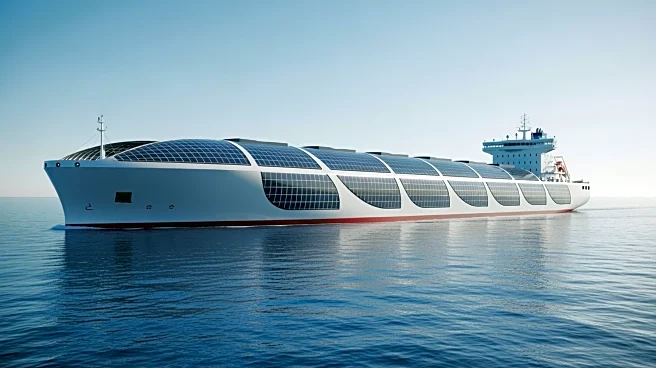What's Happening?
Wattlab has been contracted to install its onboard solar energy system on the BRF Froan, the world's largest battery-powered bulk carrier owned by Norwegian shipping company Berge Rederi. The vessel, currently
under construction, will transport marble from Brønnøy and Visnes to a production plant in Elnesvågen, Norway. The installation of 96 Solar Flatracks will occur during a stop-over in Flushing, Netherlands, next summer. The BRF Froan will feature rotor sails and a 23.5MWh battery package, charged at ports equipped with shore power facilities, ensuring emission-free cargo operations.
Why It's Important?
The integration of solar panels and battery technology on the BRF Froan represents a significant step towards sustainable maritime operations. This development highlights the shipping industry's shift towards reducing carbon emissions and reliance on fossil fuels. By utilizing renewable energy sources, the vessel sets a precedent for future bulk carriers, potentially influencing industry standards and encouraging investment in green technologies. The move aligns with global efforts to combat climate change and reduce the environmental impact of shipping, a major contributor to greenhouse gas emissions.
What's Next?
As the BRF Froan nears completion, the successful implementation of solar and battery technologies could lead to increased interest and adoption of similar systems in the maritime industry. Shipping companies may explore partnerships with renewable energy firms to retrofit existing fleets or design new vessels with sustainable features. Regulatory bodies might also consider incentivizing green shipping practices, further accelerating the transition to environmentally friendly maritime operations.
Beyond the Headlines
The adoption of solar energy in shipping raises questions about the long-term viability and cost-effectiveness of renewable technologies in harsh maritime environments. The success of the BRF Froan could drive innovation in solar panel durability and efficiency, potentially leading to breakthroughs in renewable energy applications beyond shipping. Additionally, the project may inspire broader discussions on the role of renewable energy in achieving global sustainability goals.








